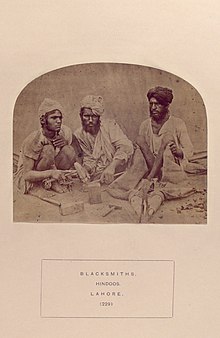Lohar (caste): Difference between revisions
Tags: Mobile edit Mobile web edit |
Unsourced, unreferanced, caste promotion Tags: section blanking Mobile edit Mobile web edit Advanced mobile edit |
||
| Line 29: | Line 29: | ||
* [[Rajasthan]]: Lohar, [[Mistri caste|Mistri]], Panchal, Suthar |
* [[Rajasthan]]: Lohar, [[Mistri caste|Mistri]], Panchal, Suthar |
||
* [[Tamil Nadu]]: Lohar, Vishvabrahmins, Kamaalar, Aachari or Aasaari |
* [[Tamil Nadu]]: Lohar, Vishvabrahmins, Kamaalar, Aachari or Aasaari |
||
== Notables == |
|||
{{unreferenced section|date=March 2022}} |
|||
* [[Jassa Singh Ramgarhia]], a Sikh Warrior who in the battle of Delhi defeated the [[Shah Alam II]] and detached the throne of the Mughal Empire and brought it on an elephant to Amritsar, which is now kept in [[Ramgarhia Bunga]] |
|||
* [[Karmakar|Janardan Karmakar]], cannon maker of the [[Jahan Kosha Cannon]] and the [[Dal Madal Kaman]] |
|||
* [[Nizam Lohar]] (1835–1877), Indian freedom fighter from Punjab |
|||
* [[Nadeem Saifi]], Indian music director |
|||
* [[Sitaram Panchal]], Indian film actor |
|||
* [[Deepak Lohar]], Indian actor |
|||
* [[Alam Lohar]] |
|||
* [[Arif Lohar]] |
|||
* [[Danish Akhtar Saifi]], Indian wrestler and Actor |
|||
* Bheema Lohar (Weapon Maker) from Maharastra |
|||
*[[Rahul Vishwakarma]] (Crickter from Nepal) |
|||
* |
|||
* |
|||
* [[Kayadu Lohar]] |
|||
* |
|||
== States == |
== States == |
||
Revision as of 13:54, 31 October 2022
This article needs additional citations for verification. (July 2022) |
 | |
| Regions with significant populations | |
|---|---|
Lohar is a social group in India, Nepal and Pakistan.[1][2] They are associated with iron smelting work. They form part of a loose grouping of traditionally artisanal castes known as Panchals.[3]
Lohars worship Lord Vishwakarma and other Hindu gods and claim to be Vishwakarma's descendants.[citation needed] Lohar caste is included in OBC in different parts of India. Regional synonyms include Vishwakarma and Saifi/Tarkhan (for Muslims).
Names
Lohar are known by varied surnames in different regions.
- Assam: Lohar, Karmakar, Vishwakarma
- Andhra Pradesh: VishwaBrahmins,Lohar, Achari, Chary, and Acharya
- Bengal: Lohar, Karmakar, Raut, Majhi, Dandamajhi, Dalui, Sutar
- Bihar and Uttar Pradesh: Lohar‚ Sharma, Vishwakarma and Thakur
- Jammu and Punjab : Lohar, Verma, Tarkhan, Mistri
- Delhi: Lohar, Panchal
- Haryana: Lohar, Dalwal, Tanwar, Panwar, Solanki, Chauhan, Dangi, Karhera, Dharra, Bhavra, Siwal, Panchal, Bhardwaj, pitlehra
- Jharkhand: Lohar, Lohra, Lohara
- karnataka : Lohar, kammara, Achari, kambar
- Kerala : Lohar, Achari, Vishwakarma, Ashari, Panjal
- Maharashtra: Lohar, Suryavanshi, Kale, Dharankar, Chavhan, Pawar, Panhalkar, Yande, Borkar, Ghotekar, Manekar, Dhuratkar, Nagare, Thorat, Ingle, Dangre, Upankar, Mane, Ighe, Koshe, Waghodekar, Kumbare, Panvalkar, Dhole, Pakhale. In Konkan Area Shemadkar, Katalkar, Gulekar, Shirvankar, Ghadi, Masurkar, Chaphekar, Masurkar, Pomendkar,
- Gujarat: Lohar, Panchal,Makwana, Pitroda, Chitroda, Parmar, Pithva, Suthar, Mistry, Gohil.
- Nepal: Lohar, Vishwakarma (caste)
- Orissa : Lohar, Moharana, Mohapatra, Sutar, Sahu, Parida
- Punjab: Lohar, Saifi/Tarkhan
- Rajasthan: Lohar, Mistri, Panchal, Suthar
- Tamil Nadu: Lohar, Vishvabrahmins, Kamaalar, Aachari or Aasaari
States
Gujarat
Himachal Pradesh
Tarkhan and Lohar are two castes in Himachal Pradesh. Sikh Lohar are known as Tarkhan. While the Lohar caste has been included in the SC, the Tarkhan caste has been kept on the OBC List. The two castes are the same for all social and matrimonial purposes.
Bihar
- In Bihar Lohara/Lohra caste comes under Scheduled Tribes.[4]
Jharkhand
The Lohar in Jharkhand are locally known as Lohra or Lohara. They speak regional languages such as Nagpuri, Khortha and Kurmali.[5]
Madhya Pradesh
The Lohar of Madhya Pradesh are also called Panchal (five sub-castes) since Lohar is one of the five sub-castes of Vishwakarma.
Uttar Pradesh
The Lohar are one of the most widespread OBC communities in Uttar Pradesh.[6] They are divided along religious lines, with the Hindu Lohar known as Vishwakarmas and Muslim Lohars known as Saifis. They are further divided into exogamous groupings, notably the Sharma and Vishwakarma. Most Lohar engage in their traditional occupation of metal fabrication, although the majority of those in western Uttar Pradesh are cultivators. The assimilated Lohar speak Hindi and its various dialects such as Awadhi;[citation needed] others speak Ho.[7] They consider themselves as Vishwabrahmins.
See also
References
- ^ Lohar (MUSLIM LOHAR IS SAIFI), Sharma. "In bihar vaishali lohar sharma committee organised by members of lohar sharma community". Jagran.com.
- ^ "लोहार वंश | भारतकोश". Bharatdiscovery.org.
- ^ Perez, Rosa Maria (2004). Kings and Untouchables: A Study of the Caste System in Western India. Orient Blackswan. p. 80. ISBN 978-8-18028-014-6.
- ^ "State/Union Territory-wise list of Scheduled Tribes in India" (PDF). Tribal.nic.in. Retrieved 22 July 2022.
- ^ "1 Paper for 3 rd SCONLI 2008 (JNU, New Delhi) Comparative study of Nagpuri Spoken by Chik-Baraik & Oraon's of Jharkhand Sunil Baraik Senior Research Fellow". Slideplayer.com.
- ^ "केंद्र में लोहार अभी भी ओबीसी की सूची में". Livehindustan.com.
- ^ "Ho". Ethnologue.com. Retrieved 2 May 2013.
External links
 Media related to Lohar (caste) at Wikimedia Commons
Media related to Lohar (caste) at Wikimedia Commons- "Indigenous Communities from India: Lohara". Native Planet.
- Occupational surnames
- Ethnic groups in Nepal
- Ethnic groups in India
- Blacksmith castes
- Scheduled Castes of Himachal Pradesh
- Scheduled Castes of Punjab
- Scheduled Tribes of Jharkhand
- Scheduled Tribes of Bihar
- Other Backward Classes of Haryana
- Other Backward Classes of Uttar Pradesh
- Other Backward Classes of Chhattisgarh
- Other Backward Classes of Rajasthan
- Other Backward Classes of Madhya Pradesh
- Other Backward Classes of Maharashtra
- Other Backward Classes of Bihar

